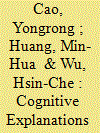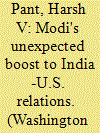| Srl | Item |
| 1 |
ID:
179268


|
|
|
|
|
| Summary/Abstract |
In recent years, the economic development of China and India and their border confrontations have intensified bilateral strategic competition. This study used the State of Democracy in South Asia survey to identify dual mindsets of competition and contingency that drive how Indians perceive China’s influence in Asia. These two mindsets are based on a cognitive schema characterized by a political predisposition against China. However, this negative orientation is moderated as more information is acquired regarding the impact of China on India. The competition mindset does not always manifest itself, and is only cognitively activated when a change is perceived in India’s power status. On the other hand, the contingent principle appears whenever competition seems to have abated, or disadvantage seems unavoidable. The mindsets of competition and contingency are not only relevant to the evolution of Sino–Indian relations, but also explain how Indian policymakers behave and respond in international society.
|
|
|
|
|
|
|
|
|
|
|
|
|
|
|
|
| 2 |
ID:
115902


|
|
|
|
|
| Publication |
2013.
|
| Summary/Abstract |
Since the Islamic Revolution, Iran and the United States have been locked in a bitter conflict. Although it has not yet degenerated into a war, as has been the case with some international conflicts, isolation of the Islamic government has become the basic objective of US foreign policy towards Iran. US policymakers maintain that economic sanctions can force the government of Iran to change its policy on many international issues. The sanctions have had their impact, as can be seen by the gradual decline in Iran-Europe relations, and the Iranian state has lost the support of its traditional partners. In such circumstances, some Iranian policymakers have proposed that Iran should replace its European partners with Asian countries in need of energy. This explains the shift in Iranian policy towards Asian countries.
|
|
|
|
|
|
|
|
|
|
|
|
|
|
|
|
| 3 |
ID:
142993


|
|
|
|
|
| Summary/Abstract |
A new government took office in India in May 2014 under the prime ministership of Narendra Modi. One of the first decisions it took was to invite the member states of the South Asian Association of Regional Cooperation (SAARC) for the swearing-in ceremony. The decision was a surprise but widely viewed as a great move, underscoring the resolve of the new government to embed India firmly within the South Asian regional matrix. It also underlined that, even though Modi's priorities will be largely domestic, foreign policy will continue to receive due attention. Modi also immediately set for himself a frenetic pace of international travel for the remainder of 2014, covering countries as diverse as Bhutan, Japan, Brazil, Australia, Nepal, and others in Southeast Asia.
|
|
|
|
|
|
|
|
|
|
|
|
|
|
|
|
| 4 |
ID:
179615


|
|
|
|
|
| Summary/Abstract |
India’s rise on global platform over issues related to environment initiated when the former Prime Minister Indira Gandhi spoke at the United Nations Conference on Environment and Development(UNCED). India has taken a long leap since that day. In 1992, when the UNFCCC was formed, India was in the group of those nations which were vulnerable but did not have a say in the negotiations. In the early 90s phase, the conditions of India were tumultuous to make any significant stride in the economic or political spectrum.
|
|
|
|
|
|
|
|
|
|
|
|
|
|
|
|
| 5 |
ID:
092209


|
|
|
|
|
| Publication |
2009.
|
| Summary/Abstract |
The rise of India as the next Asian economic giant has become synonymous with that of the information technology (IT) sector. IT has become one of India's largest exports and revenue earners, and the expansion of the IT sector has helped to shape the growth of a new middle class free from the inhibitions that shackled the old one, and which is highly visible.1 While the consumption behaviour of this new class has created demand for a wide range of products and services, there has been growing debate that the marginalised poor have not benefited because of the paucity of resources allocated to basic public infrastructure and amenities.2 Although the government has launched a series of programmes aimed at reducing poverty, it continues to exist.3 And the poor are not happy. The Bharatiya Janata Party (BJP) headlined its campaign for the June 2004 general election 'India Shining'. It lost to the Congress Party. Some of the BJP's major regional state allies such as the Telegu Desam Party (TDP) in the state of Andhra Pradesh also lost state elections held at the same time.
|
|
|
|
|
|
|
|
|
|
|
|
|
|
|
|